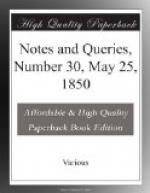As throng as Throp’s Wife.—As I was busy in my garden yesterday, a parishioner, whose eighty-two years of age render her a somewhat privileged person to have a gossip with, came in to speak to me. With a view to eliciting material for a Note or a Query, I said to her, “You see I am as throng as Throp’s wife;” to which she replied, “Aye, Sir, and she hanged herself in the dishcloth.” The answer is new to me; but the proverb itself, as well as the one mentioned by “D.V.S.” (No. 24. p. 382.) “As lazy as Ludlum’s dog, &c.,” has been an especial object of conjecture to me as long as I can remember. I send this as a pendant to “D.V.S.’s” Query, in hopes of shortly seeing the origin of both these curious sayings.
J.E.
Ecclesfield, Sheffield, April 19. 1850.
Trimble Family.—In a MS. account of the Fellows of King’s I find the following:—
“1530.—Rich.
Trimble, a very merry fellow, the fiddle of the
society, who called him ‘Mad
Trimble.’ M. Stokes of 1531 wrote
this distich on him:—
’Os, oculi,
mentum, dens, guttur, lingua, palatum
Sunt
tibi; sed nasus, Trimbale, dic ubi sit?’
By which it appears he had a very small nose; and this day, July 13, 1739, I hear that there is one Mr. R. Trimble of an English family, an apothecary at Lisburn in Ireland, who is remarkable for the same.”
As “NOTES AND QUERIES” circulate in Ireland, are there any of the family of “Trimble” now in that country, and are they distinguished by any such peculiarity?
J.H.L.
The Word “Brozier."—my brother Etonians will feelingly recollect the word “Brozier,” used by the boys for nearly a century to denote any one who had spent his pocket-money; an event of very frequent occurrence shortly after the holidays. There were also sometimes attempts made to “brozier my dame,” in case a suspicion had arisen that the good lady’s larder was not too well supplied. The supper table was accordingly cleared of all the provisions, and a further stock of eatables peremptorily demanded.
I spell the word “brozier” as it is still pronounced; perhaps some of your readers have seen it in print, and may be able to give some account of its origin and etymology, and decide whether it is exclusively belonging to Eton.
BRAYBROOKE.
April 14.
* * * * *
REPLIES.
THE DODO QUERIES.
There is no mention of the Solitaire as inhabiting Bourbon, either in Pere Brown’s letter or in the Voyage de l’Arabic Heureuse, from whence the notice of the Oiseau Bleu was extracted. I have since seen Dellon, Relation d’un Voyage des Indes Orientales, 2 vols. 12mo. Paris, 1685, in which there is a brief notice of the Isle of Bourbon or Mascarin; but neither the Dodo, the Solitaire, or the Oiseau Bleu are noticed. The large Bat is mentioned, and the writer says that the French who were on the island did not eat it, but only the Indians. He also notices the tameness of the birds, and says that the Flammand, with its long neck, is the only bird it was necessary to use a gun against, the others being readily destroyed with a stick or taken by hand.




